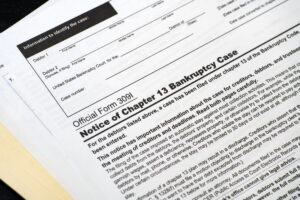
The Automatic Stay In Bankruptcy
Chapter 7 or Chapter 13 bankruptcy protects filers from creditors and debt collectors the moment their case is filed with the bankruptcy court. Creditors and debt collectors have to stop calling, writing, or garnishing filers and have to suspend all legal action, including foreclosures and repossessions.
You can thank Section 362 of the bankruptcy code for this. That’s the section that sets out the power of the automatic stay.
The automatic stay is one of the most powerful features available to individuals in personal bankruptcy.
The moment we file your bankruptcy petition, all of your creditors must stop almost every action they are taking to try and collect a debt. Filing your bankruptcy petition instantly creates a federal court order that requires your creditors to stop all collection efforts.
The automatic stay gives individuals the breathing room they need to organize their financial affairs and is the first step to creating new beginning. It’s important to remember, however, that the automatic stay is not absolute. For instance, a creditor may request a lift of the stay (by filing a Motion for Relief from Stay) in order to execute a judgment. This is particularly true of landlords or car lenders who are trying to repossess a vehicle.
What The Automatic Stay Can Not Stop
There are a few legal actions that the automatic stay will not stop. Those actions include attempts to establish paternity or enforcing a child support or spousal maintenance (alimony) order; criminal prosecutions; federal and state tax audits; and eviction actions where the landlord has obtained possession judgment.
Also, if a person has filed another bankruptcy in the previous 12 month, the filer has to ask the court to enforce the automatic stay. Repeat filers should be careful as filing bankruptcy may not offer the protection they’re looking for.
What Happens If A Creditor Or Debt Collector Violates The Automatic Stay
Creditors and debt collectors face penalties for violating the automatic stay. If the continue garnishing the filer, they have to refund the garnished funds and could face additional fines if they blatantly ignore the automatic stay. Repossessed cars will need to be returned. Foreclosures will have to be reversed. If a creditor asks a court to enter judgment after the automatic stay is in place, they have to ask the court to withdraw the judgment order.
Stopping Repossession And Foreclosure Once The Bankruptcy Is Filed
The automatic stay is temporary. It stays in place only until you get your discharge order, which will be about 100 days after you file a Chapter 7 bankruptcy. Most creditors cannot take any legal action after that, because the debt has been discharged.
But secured creditors (creditors who can take collateral like a car or a home) can repossess or foreclose after the discharge order if the filer hasn’t taken action to bring the underlying loans current.
While Chapter 7 bankruptcy doesn’t have a mechanism to allow the borrower to bring a car loan or mortgage current, Chapter 13 bankruptcy does. I’m generally reluctant to advise someone to file a Chapter 13 for the sole reason of keeping a car they’re behind on, Chapter 13 is a great way to bring a mortgage current. Chapter 13 allows the filer up to 60 months to get current on their mortgage. However, in exchange for that, the filer will be making monthly payments to the Chapter 13 trustee for those 60 months. Chapter 13 isn’t an option for everyone. We’ll explore all of your options during your initial free consultation.
Talk To An Experienced Denver, Colorado Bankruptcy Attorney About The Automatic Stay
If you’re like most people who file bankruptcy, debt collectors have probably been hounding you for months. Bankruptcy can put an end to their harassment.
To learn more about whether or not Chapter 7 bankruptcy or Chapter 13 bankruptcy is your best option, schedule your free, confidential bankruptcy consultation with a Colorado bankruptcy attorney today. Our online scheduling system allows you to schedule bankruptcy consultation at a time that is convenient for you.
Check out our client reviews on Google, Facebook, and Avvo!


